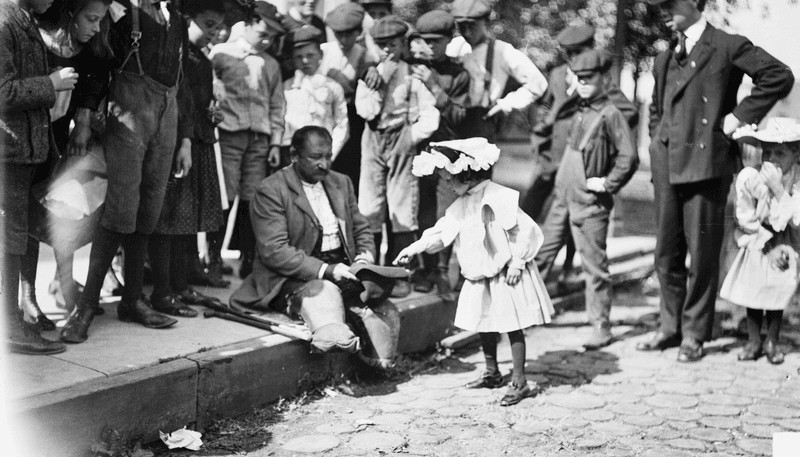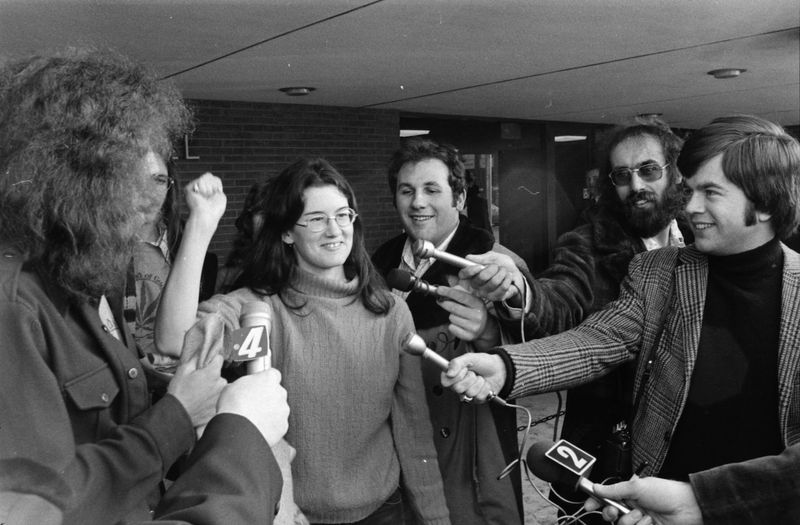The 1970s were a time of change, experimentation, and, as it turns out, some pretty strange laws. While some were meant to promote public safety, others simply reflected outdated norms or bizarre local concerns.
Here are 15 bizarre but real laws from the 1970s.
1. Ugly Laws in Various U.S. Cities (Repealed by 1974)
In the early 1970s, some U.S. cities still enforced ‘ugly laws,’ which barred individuals with visible disabilities from public view. These laws, rooted in a misplaced sense of public decency, aimed to hide what was perceived as unpleasant from the public eye. Thankfully, these laws were repealed by 1974, marking a step forward in the fight for disability rights.
Today, these laws serve as a reminder of the prejudice faced by people with disabilities. We can learn from this by fostering inclusivity and understanding in our communities.
2. Ban on Pinball Machines in South Carolina (1949, Lifted in the 1970s)
For decades, pinball machines were banned in South Carolina, deemed akin to gambling devices. The ban was finally lifted in the 1970s, allowing enthusiasts to enjoy the game without fear of legal repercussions. Pinball, once controversial, was then embraced as a popular pastime.
The change illustrated a shift in societal values and the recognition of pinball as a legitimate form of entertainment. Today, one can appreciate the nostalgia of pinball without associating it with illegal activity, reminding us how perspectives on leisure activities can evolve over time.
3. No Skateboarding on Sidewalks in New York City (1970s)
During the 1970s, New York City imposed restrictions on skateboarding on sidewalks, citing pedestrian safety concerns. This law reflected the growing pains of urban spaces adapting to new forms of youth culture. Skateboarding, seen as a rebellious activity, was pushed into designated areas, separating it from pedestrian paths. While some viewed it as necessary, others saw it as stifling youthful expression.
Today, skateparks offer a compromise, allowing skaters to practice their sport safely. This history highlights the ongoing balance between public safety and freedom of expression within urban environments.
4. Prohibition of Feeding Pigeons in San Francisco (1970s)
In an effort to manage the overwhelming pigeon population, San Francisco enacted a law in the 1970s banning the feeding of pigeons. These birds, while a common sight, were causing sanitation issues and property damage. The prohibition aimed to curb the pigeon population by discouraging their congregation in public spaces. It remains a practical solution to urban wildlife management.
For city dwellers, this law serves as a reminder of the impact human activities have on urban ecosystems. Citizens are encouraged to support wildlife preservation efforts that maintain ecological balance.
5. Rockefeller Drug Laws in New York (1973)
The Rockefeller Drug Laws, implemented in New York in 1973, were part of a nationwide wave of strict anti-drug legislation. These laws imposed severe mandatory sentences for drug offenses, even minor ones. The intent was to eradicate drug abuse but led to overcrowded prisons and criticism for its harshness.
Over time, the laws were seen as disproportionately affecting marginalized communities. This era of strict drug laws paved the way for discussions on more balanced and rehabilitative approaches to drug-related offenses. It remains a significant chapter in the history of U.S. drug policy.
6. Ann Arbor’s $5 Marijuana Fine (1974)
In 1974, Ann Arbor, Michigan, made headlines by reducing the penalty for marijuana possession to a mere $5 fine. This lenient approach stood in stark contrast to the harsh drug laws of the time. The change reflected a more relaxed attitude towards marijuana, emphasizing personal freedom and a move away from stigmatization.
As a progressive city, Ann Arbor’s policy was seen as a bold, albeit controversial, step towards drug decriminalization. This law remains a landmark in the history of marijuana legislation, illustrating the ongoing debate over drug policies and personal liberties.
7. California’s Ban on Self-Service Gas Stations (1970s)
To enhance safety and control over fuel dispensing, California banned self-service gas stations in the 1970s. This law required attendants to pump gas for customers, ensuring expert handling of potentially dangerous substances. While intended to prevent accidents and ensure proper service, it also created jobs.
Some saw it as inconvenient, while others appreciated the personalized service. Although self-service stations are common elsewhere, parts of California still uphold this tradition. The law exemplifies a regional approach to safety and customer service, highlighting how states can tailor regulations to local needs.
8. Florida’s Prohibition of Singing in Public Places While Wearing a Swimsuit (1970s)
In the 1970s, Florida had a peculiar law prohibiting singing in public places while wearing a swimsuit. This regulation, likely aimed at maintaining public decorum, seemed more amusing than practical. It reflected societal norms about modesty and public behavior during a time of cultural change.
While rarely enforced, it added to Florida’s reputation for quirky laws. Today, it stands as a curious relic of the past, reminding us of the evolving standards of public life. It encourages us to reflect on how laws can sometimes capture the eccentricities of their times.
9. Massachusetts’ Ban on Quakers (1970s)
Remarkably, an old colonial law banning Quakers from living in Massachusetts was technically still on the books in the 1970s. Although unenforced, it highlighted the persistence of archaic legislation. This law originated during a period of religious intolerance, when Quakers faced persecution for their beliefs.
By the 1970s, the ban was a mere historical footnote, reflecting the slow progress of legislative reform. It serves as a reminder of the importance of regularly revising laws to ensure they align with modern values. The law’s presence prompts reflection on religious freedom and tolerance.
10. Alabama’s Ban on Driving Blindfolded (1970s)
Alabama’s 1970s law banning driving while blindfolded might seem unnecessary, but it addressed potential daredevil stunts. This quirky regulation reflects a time when legal measures sometimes catered to the bizarre. While it seems like common sense, codifying it into law ensured no one attempted such a reckless act.
This law is a lighthearted reminder of the variety of regulations that can exist. It underscores the importance of common sense in legal stipulations. Today, it’s often cited as an example of amusing yet prudent legislation that curbs potentially hazardous behavior.
11. Oregon’s Requirement for Shoelaces to Be Tied While Walking (1970s)
In the 1970s, Oregon passed a law mandating that individuals tie their shoelaces while walking. This peculiar requirement aimed to prevent tripping hazards and ensure pedestrian safety. While it might seem overly cautious, it speaks to the era’s concern for public safety.
The law encouraged personal responsibility, reminding individuals to be mindful of small details that could cause harm. Today, it stands as a quirky piece of legal history, showing how laws can sometimes address seemingly trivial matters. It emphasizes the need for a balance between safety regulations and personal freedom.
12. Texas’ Law Against Selling Limburger Cheese on Sundays (1970s)
Texas once had a law prohibiting the sale of Limburger cheese on Sundays, likely due to its strong odor. This unusual restriction reflected a time when blue laws governed Sunday activities, aiming to maintain Sunday as a day of rest.
The law seemed to target the cheese’s pungent nature, which could disrupt the tranquil Sunday atmosphere. Although peculiar, it highlights how cultural norms influenced legislation. Such laws are mostly obsolete today, but they remind us of how societal values can shape regulations. It’s a humorous example of how specific tastes can influence local laws.
13. Nebraska’s Prohibition of Whale Fishing (1970s)
Despite being landlocked, Nebraska had a law against whale fishing in the 1970s. This absurdity likely stemmed from boilerplate legal language rather than a serious threat of whale fishing. The law became a source of humor, highlighting how legislative processes can produce amusing outcomes.
It underscores the importance of tailoring laws to regional realities. While whales never graced Nebraska waters, the law serves as an example of the quirks that can arise in legal systems. It encourages lawmakers to ensure legislation is relevant and practical, avoiding unnecessary legal oddities.
14. Ohio’s Ban on Getting Fish Drunk (1970s)
Ohio’s law against giving alcohol to fish was designed to protect aquatic life from human interference. While it might seem humorous, the law underscores the state’s commitment to preserving natural habitats. It addressed concerns about the impact of alcohol on fish behavior and ecosystem balance.
Though the likelihood of such incidents was low, the law highlighted a proactive approach to environmental protection. It serves as a reminder that human activities can have unintended consequences for wildlife. Today, it stands as a testament to the creative lengths states go to in safeguarding their natural resources.
15. Georgia’s Ban on Carrying an Ice Cream Cone in Your Back Pocket on Sundays (1970s)
In Georgia, a peculiar 1970s law prohibited carrying an ice cream cone in one’s back pocket on Sundays. This quirky regulation likely aimed to prevent horse theft, as horses could be led away by someone with a tempting treat.
Though humorous, the law illustrated creative legal measures addressing unusual problems. It reflects how past societies devised laws for specific cultural contexts. While amusing today, it reminds us of how inventive legal solutions can arise from practical concerns. This law adds a playful touch to the history of American legal regulations, sparking curiosity about its origins.















